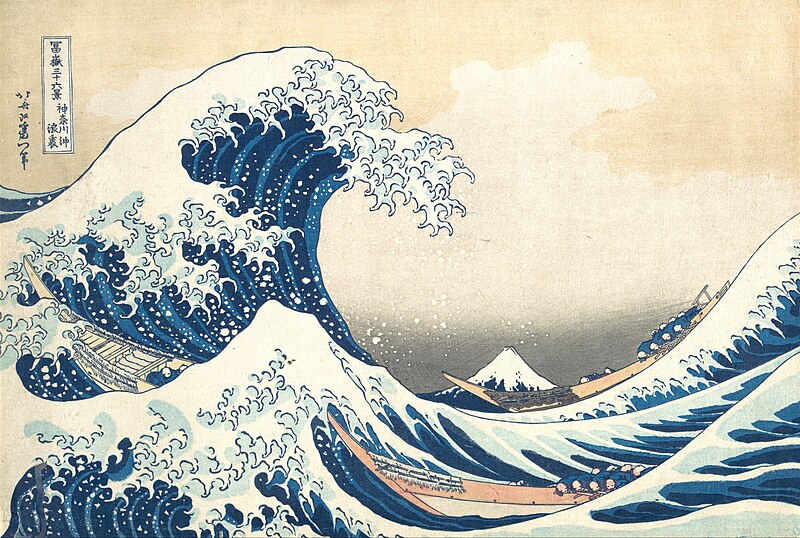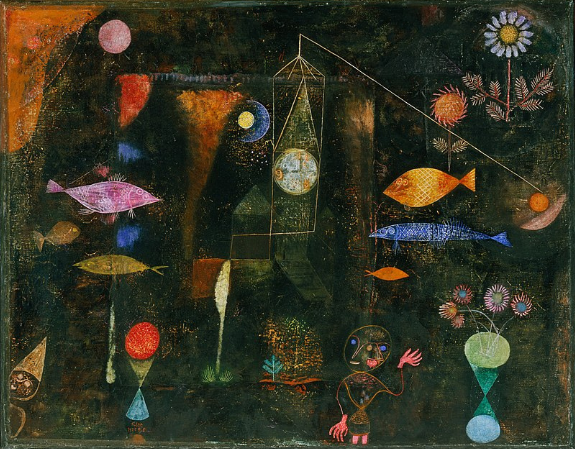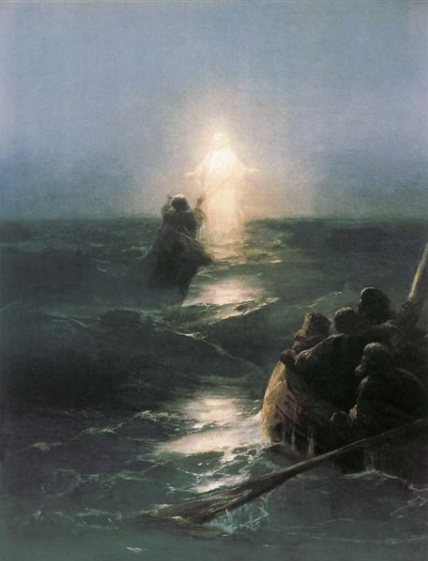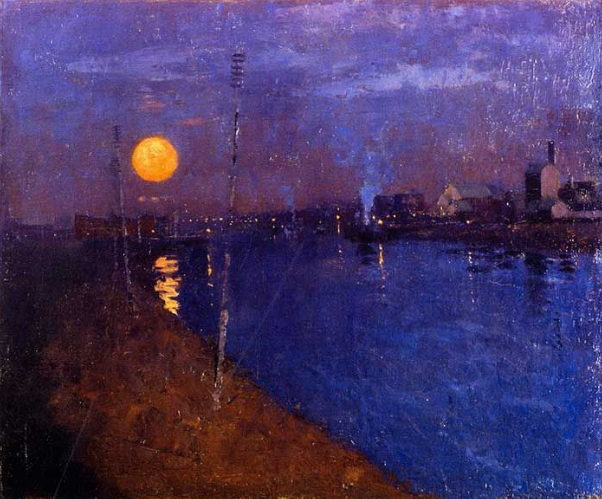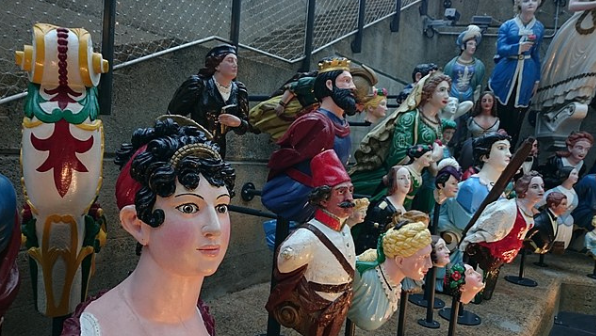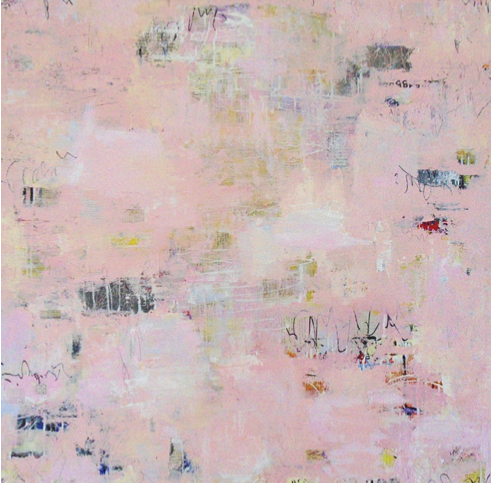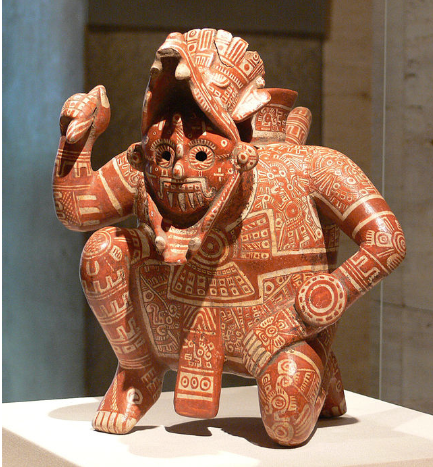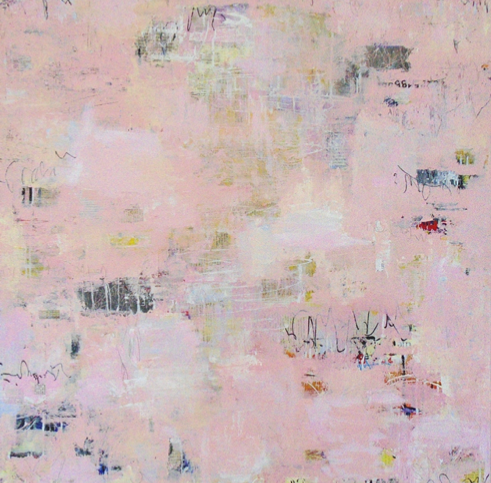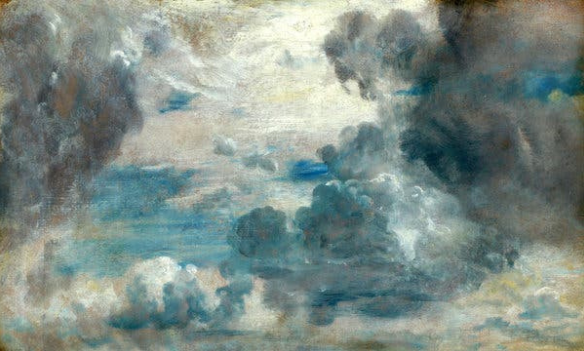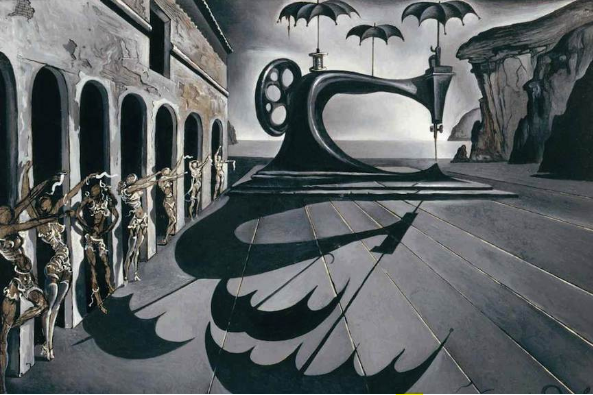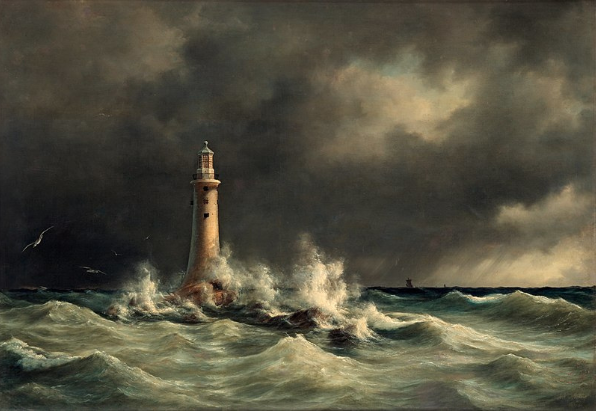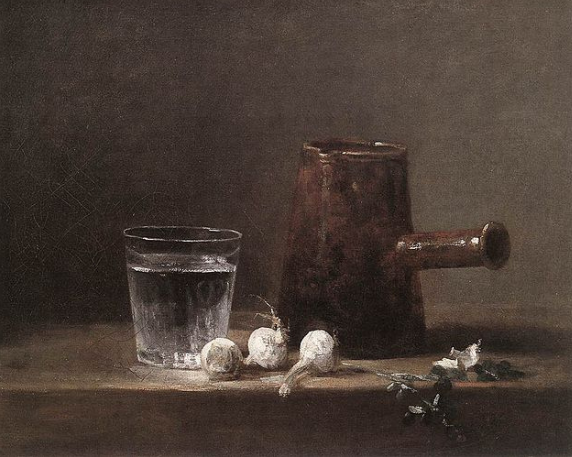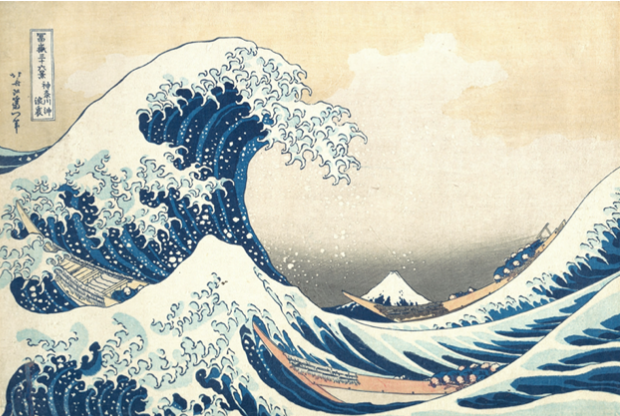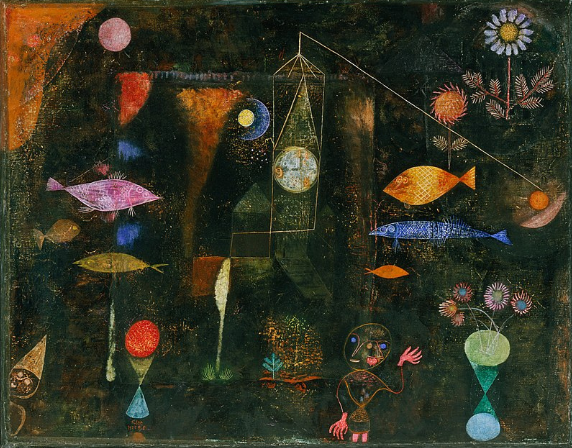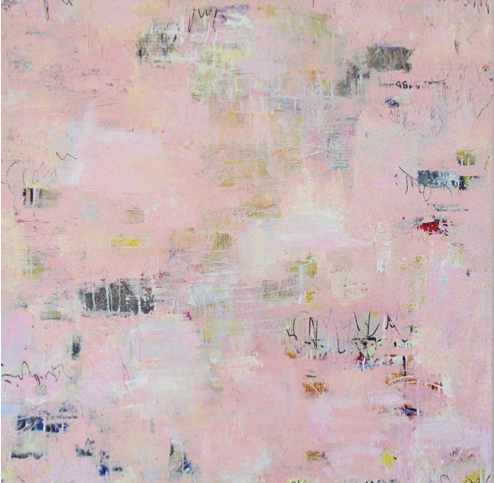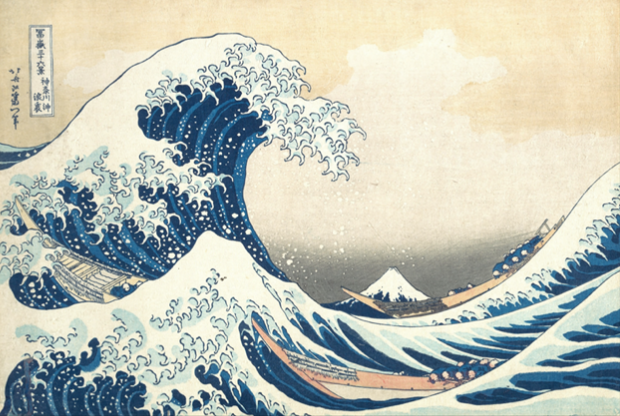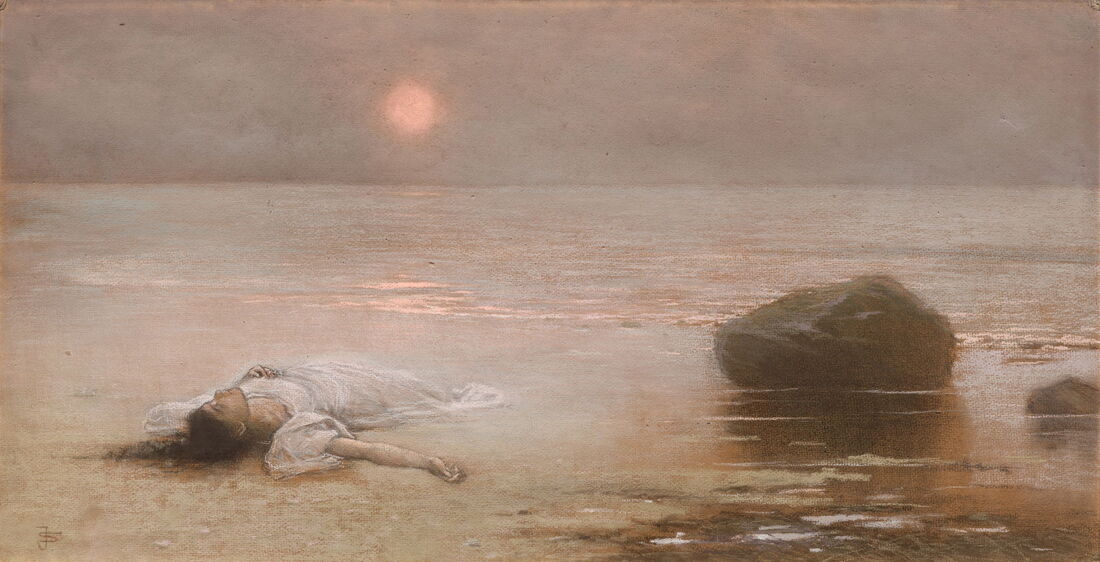|
The Ekphrastic Review says a big congratulations to Kimberly Hall, whose poem, "Three Symphonic Sketches" has won the Water contest! Thank you to Kimberly and to all of the wonderful finalists below, and to every single one of you writing to these curated thematic collections. I am especially thankful to Sandi Stromberg for her time and consideration and for this important work. All of the reading for this contest was done blind. So we were surprised by the results after deliberations. Several finalists had more than one work in the top 20. The winner, Kimberly Hall, had three! Also surprising was how many of the finalists wrote to the same work of art. There were 50 choices to write about, but so many great pieces after the famous Great Wave painting, Klee's painting, the moonlight on water work by Henry, and my own abstract work, A River Without Water. While a wide variety of the works showed up in the entries, a few inspired many to write wondrous things. The finalists' works are shown below in alphabetical order by name, with Kimberly's winning poem first in the sequence. We thank each and every one of you for reading these writers, for sending your submissions, for supporting the journal, and for making this community so amazing. THANK YOU. Lorette ** Congratulations to everyone who entered the Water contest, and of course, to the finalists and the winner. I loved immersing myself in the myriad responses. I read each and every piece several times with appreciation for each writer’s thoughtful and compelling work. Then, I faced the challenge of making selections. Kimberly Hall’s “Three Symphonic Sketches” rose to the top for her ability to capture the symphonic sound of Hokusai’s Great Wave. But please read all the selections presented here. Each one invites us to experience more deeply the chosen work of art. Sandi Stromberg ** The Finalists The World to Come, by Valerie Bacharach The Catch, by Lizzie Ballagher The Glasgow Boy Speaks, by Lizzie Ballagher Icons, by Portly Bard A River Without Water, by Portly Bard What my glass-half-empty eyes see…by Dorothy Burrows Rain God Vessel Lamentation, by Helen Freeman Nightfruit, by Julia Griffin Haibun on A River Without Water, by Kimberly Hall Portents: Haiku, by Kimberly Hall Three Symphonic Sketches, by Kimberly Hall (First Place Winner) The Shadows, by Amy Holman Eddystone Lighthouse, by Anton Melbye (Denmark) 1846, by Sue Mackrell Canticle of Dreams, by Mary McCarthy A glass of words from the kitchen tap, by Sandra Noel What the wind knows, by Sandra Noel The Mariana Trench, by Barbara Ponomareff the river's slow face, by Janet Ruth Writing with Hokusai, by Janet Ruth Final Sky, by F.F. Teague First Place Winner!!!! Three Symphonic Sketches In 1905, composer Claude Debussy requested that the image of Hokusai’s Kanagawa-oki Nami Ura be printed on the front cover of the published score of his newest orchestral work, titled La mer; Debussy kept a copy of this artwork in his studio, and used it as inspiration. I. First, a wash of colour. Shimmering harps and strings like sunlight soar high above the waves, bass and bass drum rolling steady beneath them. Chords and motifs dissolve into a soundscape of blue – brisk blue wind over bubbling blue water, light flutes and dark bassoons and boundless rippling cellos – all watercolour and ocean spray, blossoming against the horizon. a cloudy spring haze – seawater and sunrise meet, claws crest and retract II. Second, the scherzo. Not just colour, but movement. A strange and glittering dance with ever-changing steps. Phrases seem to shape themselves – texture and timbre toss each other in and out of earshot, with a sort of playfulness that cares not whether it leads its listener to familiar shores or into unfamiliar depths. foam like dragons’ pearls, dancing on the waves – waves that scatter boats like fish III. Finally, the storm. Horns and trumpets, rumbling first and then growing, growing, as a growl grows into a roar. Wind and bass and brass and strings – the whole orchestra strengthening into a swell, swelling into a surge – surging into a thunderous chorale that reaches up through the mouth of a distant sea and brings the great wave to life. the sea-god wakes, and between its curls – the dawn’s first glimpse of Mount Fuji Kimberly Hall Kimberly Hall (she/her) is a queer and neuro-divergent poet and writer. She received her master's degree in behavioral science from the University of Houston-Clear Lake. Her poetry and prose can be found in online publications such as First Flight, Sappho's Torque, and Equinox, as well as in several ekphrastic poetry anthologies and a brand new anthology from Mutabilis Press. She still gets the idiomatic butterflies whenever anyone mentions these things where she can hear them. The World to Come An imperious galaxy holds multitudes. A clock ticks past and future as gold and cobalt fish swim in random patterns of here and gone, return and leave. See the mother with her two faces, heart-shaped mouth when she remembered love, the other all blank eye and shuttered lips. A vermillion fish, nostalgic for its beginning, glimmers. The clock ticks star and planet while flowers sprout in scented water, spread their leaves and petals. See the mother’s upraised hand, empty of names. The moon eats the sun, the clock spins eternity, fish dazzle in the darkening sea. Valerie Bacharach Valerie Bacharach is a proud member of Carlow University’s Madwomen in the Attic writing workshops. Her writing has appeared or will appear in publications including Pittsburgh Poetry Review, Pittsburgh Quarterly, The Tishman Review, Topology Magazine, Poetica, The Ekphrastic Review, Talking/Writing, and Vox Viola. Her chapbook, Fireweed, was published in August 2018 by Main Street Rag. The Catch Hungry, still, for solitude, he sent us off across the lake ahead of him: went aside alone, this time, to meet with God, his Father. Reluctantly, we rowed away, hauled, heaved against the growing surge of angry waves that sent us floundering, spinning, helpless on the disfigured face of Galilee’s wide water. We tasted terror then, tormented by the force of wind that clenched our innards, pitched us into Sheol’s deeps, dashed us down the crags of water into the gnashing teeth of a storm. Now: how in a towering tide & torrent were we to fare without our Lord? The mast curved over, sang out, whined. Our puny rudder failed. The sail sprang out & snapped, tore, flashed away into a squalling wind until we bawled in fear of death, shouted, eyes shoreward, that we saw an apparition. And yet, no phantom it was but Christ himself in very flesh walking the rage & roar of wave-crests, holding wide his all-embracing arms to clip & keep us in. No catch of fish more dear to him! We understood at once he was the Everlasting One, He who then cried out to us: Cannot I who hurled stars across the void, who brooded over deep primeval waters-- cannot I, radiant over chasms of blue darkness, now walk across this wildness so to find you, call you home? Lizzie Ballagher In 2022, Ballagher was chosen as winner in Poetry on the Lake's formal category with a pantoum entitled ‘Across the Barle’. Her work has appeared in print and online on both sides of the Atlantic; it has also been presented in podcasts on Poetry Worth Hearing (Anchor fm). Several of her poems in the last two decades have, too, been set to music. Contributing regularly to Southeast Walker Magazine, she lives in the UK, writing a blog: https://lizzieballagherpoetry.wordpress.com/. The Glasgow Boy Speaks, 1887 River Landscape by Moonlight, George Henry, 1887) South o’ the border all the blether’s now aboot Victoria’s Golden Jubilee, while here in the North Countree men gang up long before the skreich o’ day tae drive haem rivets, slave at smelting lums along the Clyde-- and all tae keep her majesty in a style she is entitled tae (they say) with Sassenachs and swaggering lairds who think we’re teuchters-- gyte as the moon that sinks down tae the river-- clarty by our guid labours… Yet, open up your een, ye glaikit southren folk, and see the braw dance o’ light even in the scribble of an antic moon, the reek o’ blazing furnaces-- the heft o’ steel and coal; the sweat on backs o’ men bowed doon…. Here winter days are nae sae lang, so we mun keek wi’ inner een tae find the brilliance o’ bonny light in darkness. Lizzie Ballagher Glossary blether gossip, chat gang go skreich o’ day daybreak drive haem drive home lums chimneys Sassenachs the English teuchters rough characters gyte mad clarty dirty guid good een eyes glaikit gormless, empty-headed braw brave, beautiful nae sae lang short mun keek must look Icons These once the pride beneath the prow of storied wood from stern to bow are now but remnants left to gauge the wonder of their golden age when keels beneath the waterline would harness wind above the brine in timbered sails to brave the roar that souls defiant dared explore by going west to reach the east believing waters never ceased, that plane ordained they ought to fear was more illusion wrought by sphere and spirit by which they were led was more than merely figurehead. Portly Bard Old man. Ekphrastic fan. Prefers to craft with sole intent... of verse becoming complement... ...and by such homage being lent... ideally also compliment. Ekphrastic joy comes not from praise for words but from returning gaze far more aware of fortune art becomes to eyes that fathom heart. River Without Water I see the bottom of a heart imagined as ravine where love is intermittent rain it always seems between and idle dreams are fragile shards that peek from coral sand as precious trove of treasured lore enduring close at hand yet better left where widely strewn, assembled unrestored, in art that gives them homage due, but leaves them unexplored, accepted as the arid pain where scars were etched...and will remain. Portly Bard Old man. Ekphrastic fan. Prefers to craft with sole intent... of verse becoming complement... ...and by such homage being lent... ideally also compliment. Ekphrastic joy comes not from praise for words but from returning gaze far more aware of fortune art becomes to eyes that fathom heart. What my glass-half-empty eyes see… Upon an ink-blotched river, shimmering oil spills, patches and traces of chemical trash. A concrete walkway, cracked and lifeless; still harbouring the trunks of two dead trees. From old warehouse bones smart apartments, well-lit; but no brightness for the homeless. Against the urban skyline, from pyres of wrecked cars, a suffocation of thick smoke; the shiver of celestial sharks, their ghost-fins splashing in a boiling, rising ocean. A gigantic plastic orange, air-swept, bloated; bobbing uneaten above sick coral… the harvest moon. Dorothy Burrows Based in the United Kingdom, Dorothy Burrows enjoys writing flash fiction, poems and short plays. Her work has been published by various journals, including The Ekphrastic Review. For some years, she travelled to school on a ferry boat. Rain God Vessel Lamentation It’s this stance I’m forced to hold, my left knee aches, my right elbow too and I worry about the onset of arthritis. My moustache needs a trim, coyote headdress smells of squirrel, ringed eye openings skew my vision and a developing fracture surely spells trouble. They told me I’d be given a club and shield to supplement my four remaining fangs, but to say I’m gutted at their size is an understatement – almost like a watch and pen which would have been more use. Guess I’m not too sure why I need them. Nobody asks me what I want and aren’t I the god here anyway? Can someone please fill this water container or at least dampen me with mist and spritz me with dew? I long for clouds to subdue my surroundings like an arctic cloak and slick my cheeks with moisture. Mother of Jesus, tell them to fill me to the brim. Let me be drenched, overflowing, hailed by farmers and warriors, prophets and priests, parents and children the world over. Endue me, for pity’s sake, with even one drop of real power. Helen Freeman Helen Freeman started writing poetry during recovery time from a serious road traffic accident in Oman and got hooked. She has been published in several magazines and supplements including with Corbel Stone Press, Ink, Sweat and Tears, Clear Poetry, Algebra of Owls, Ground Poetry, Your One Phone-call, Open Mouse, Red River Review, Barren Magazine, The Drabble, Sukoon, Poems for Ephesians and The Ekphrastic Review. Some of her ekphrastic poems were published alongside related Diane Rendle paintings at an exhibition in Open Eye Gallery, Edinburgh. She taught English for many years in Kenya, Tanzania, Oman and Dubai and now lives in Durham, England. Nightfruit So the bright orange Scribbles itself by night Into the deep blue: Beauty of Seville, Framed as a secret Spanish Exclamation point¡ Julia Griffin Julia Griffin lives in South-East Georgia. She has published in Light, Lighten Up Online, Snakeskin, and some other magazines. Haibun on A River Without Water Dry wind carries no water across these still beds. What was once bright and fertile now hears only the echo of rain, holds only the memory of flood. Scraps emerge like phantoms in the night. Feet splashing, a wet rush of blood, ripples and riptides and roaring thunder – shadows, sluggishly crawling out from darkened desert, coming to rest against eager palms. Scraps, like phantoms, dissolve once more, crumbling to dust in the hot white light of day. no thirst is quenched by memory alone – where dreams run instead of rivers. Kimberly Hall Portents: Haiku morning overcast – clouds like honeycomb, now sweet, hold tomorrow’s storms Kimberly Hall The Shadows It’s raining bullets in 1941, and the seamstress whores are waving white handkerchiefs in a chiaroscuro of recruitment and sympathy. The machines are shielded from the commands for pleats and A-lines, fitted; a waste. The seamstresses are lonely, Surrendering their men to Franco Amy Holman Amy Holman is a poet, literary consultant and artist. The author of five poetry books, including the prizewinning chapbook, Wait for Me, I’m Gone, from Dream Horse Press, and the collection, Wrens Fly Through This Opened Window, from Somondoco Press, her poems have recently appeared in The 5-2: Crime Poetry Weekly, The Chiron Review, and The Night Heron Barks. Eddystone Lighthouse by Anton Melbye (Denmark) 1846 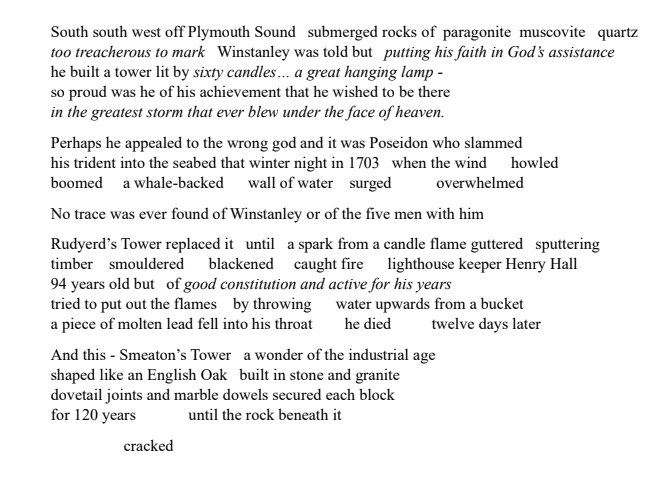 Sue Mackrell Author's note: Words in italics are from contemporary sources. Sue Mackrell lives in Leicestershire, UK. She has an MA in Creative Writing from Loughborough University. Retirement from teaching and facilitating Creative Writing workshops gives her more time to write. Her poems have been published several times in The Ekphrastic Review and Agenda, also recently in Bloody Amazing (Dragon Yaffle) Diversifly (Fair Acre Press) Whirlagust III (Yaffle) and online in Words for the Wild. Canticle of Dreams Like a fist unclenched a leaf falling the balance of attention lapsed I slide wordlessly down past the surface into the dark ocean of sleep where bright fish rise finned and scaled the shimmering glint of sequins winking in glittering spangles that catch whatever light shines through the water my dreams fantastical and strange as their ancient shapes whispering without sound like liquid hieroglyphs antiphon to the long songs of whales that fill me with a desperate longing to stay here with them and learn to breathe without air Mary McCarthy Mary McCarthy is a retired Registered Nurse who has always been a writer. Her work has appeared in many journals and anthologies, including The Ekphrastic World, edited by Lorette C. Luzajic, The Plague Papers, edited by Robbi Nester, and recent issues of Gyroscope, 3rd Wednesday, Caustic Frolic, the Blue Heron Review, and Verse Virtual. Her collection How to Become Invisible will come out from Kelsay early next year. A glass of words from the kitchen tap I hold its story in my mouth, just long enough for the taste of clean to paddle on my tongue, to hear the echo of pins-and-needle rain. A hint of salt swaddles my throat, tells of another latitude, a time before your dark. It doesn’t seem to matter how many times I go to the tap to refill your glass; it remains full of wordless words, empty. Sandra Noel Sandra Noel is a poet from Jersey, Channel Islands. She enjoys writing about the ordinary in unusual ways, nature themes and her passion for sea swimming weaving through many of her poems. Sandra has poems featured online and in print magazines and anthologies. This year she has been longlisted by Mslexia Women’s Poetry Competition 2023, highly commended in The Yaffle Press Competition 2023, and commended in Poetry on the Lake’s Haiku competition 2023. Two of her poems are currently on the buses in Guernsey as winners in the Guernsey International Poetry Competition 2022. Sandra is working on her first collection. What the wind knows Even when the sea is turning inside out, and the ferry lurches green folk starboard, the bottle on the table knows how to hold the wine in the shape of itself; in the way a shadow holds the shape of the wave just long enough, until it crashes back to itself, and the boat lurches port side. Sandra Noel The Mariana Trench He dreamed himself through layers of dark, all smudge and pitch-black night penetrating the earth’s mantle in search of its core, he fell deeper and darker past trees, houses, the clock on the tower which faded as he passed dream-memories shapeshifted objects into pure form as if creating road signs to nowhere memories of gardens – flowers, leaf, petal and stem, some formed like the rays of the sun turned into symbols of loss. Only the fish, magical and singular, appeared to know where they were going as if connected by a sizzling current. Aglow, as if lit from inside by lanterns carried in children’s hands. Onward his body drifted amongst the shapes, weightless and heavy at once. Imagining his own phosphorescence, he sunk deeper and darker through time and space out of the known. Over 11,000 meters deep – to a depth even his dreams could not fathom. Barbara Ponomareff Barbara Ponomareff lives in southern Ontario, Canada. By profession a child psychotherapist, she has been fortunate to be able to pursue her lifelong interest in literature, art and psychology since her retirement. The first of her two novellas, dealt with a possible life of the painter J.S. Chardin. Her short stories, memoirs and poetry have appeared in Descant, (EX)cite, Precipice and various other literary magazines and anthologies. She has contributed to The Ekphrastic Review on numerous occasions and was delighted to win one of their flash story contests. the river’s slow face kingfisher cackles from the shadows seeing with ears eyes seek the river’s waking her face turned away view of sky painted pink with dawn just her reflections rosy dreams of cherry blossoms falling drift of mist a glimpse where mist pulls thin dark waters scribbled on river surface a few reeds a slight breeze dabbles at the stillness lifting Janet Ruth Janet Ruth is a NM ornithologist. Her writing focuses on connections to the natural world. She has recent poems in Oddball Magazine, Tulip Tree Review, The Ocotillo Review, Sin Fronteras, Spiral Orb and anthologies including Moving Images: poetry inspired by film (Before Your Quiet Eyes Publication, 2021) and New Mexico Remembers 9/11 (Artemesia Publishing, 2020). Her first book,Feathered Dreams: celebrating birds in poems, stories & images (Mercury HeartLink, 2018) was a Finalist for the 2018 NM/AZ Book Awards. https://redstartsandravens.com/janets-poetry/ Writing with Hokusai tallest mountain a matter of perspective my fragile boat the wave crashes down truth worse than my fears bending prows into the bite of wind bending to fate should I pray or laugh into the howling? salt crusts my face Mt. Fuji diminished below sky full of ash foam reaches like fingers at the wave’s crest all that lies beneath Janet Ruth Final Sky He found her there at sunrise, on the beach, first sighting her from cliffs above the shore, one arm extended – not, though, in a reach, but as the tide had swept her from the floor of churning ocean. For a while he stood and told himself she hadn’t drowned; she slept, that’s all. She’d wake, recovered, and they would be happy once again. And then he wept and fell upon the sand and beat his fists upon the sodden grains and shells and stones amidst the early morning milling mists that struck their clammy chills within his bones. And still the sun rose in that final sky as he strode out to sea, resolved to die. F.F. Teague F.F. Teague (Fliss) is a copyeditor/copywriter by day and a poet/composer come nightfall. She lives in Pittville, a suburb of Cheltenham (UK). Her poetry features regularly in the Spotlight of The HyperTexts; she has also been published by The Mighty, Snakeskin, The Ekphrastic Review, The Dirigible Balloon, Pulsebeat, Lighten Up Online and a local Morris dancing group. Other interests include art, film, and photography.
0 Comments
Your comment will be posted after it is approved.
Leave a Reply. |
Challenges
|
